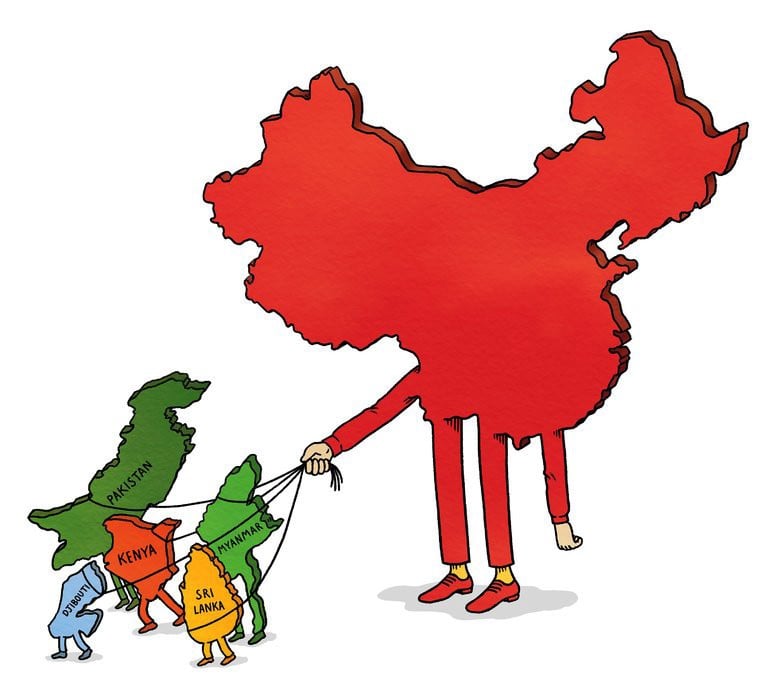China’s Debt Trap Diplomacy: The New Face of Colonialism in the Global South
China’s expanding global influence is no longer just about trade—it's about control. From Africa to Asia, Beijing’s use of unsustainable debt, opaque infrastructure deals, and political coercion is reshaping the developing world in its image. The world must wake up to the reality: this is not partnership; it’s neo-colonialism in disguise.
OPINIONPOLITICS
Emmanuel Makome
5/2/20252 min read


Across the Global South, from Nairobi to Colombo, one pattern is becoming unmistakably clear: China is not just a business partner—it’s a power broker. What Beijing has built over the past two decades through its Belt and Road Initiative (BRI) is not simply a global trade network; it is an expansive debt-fueled strategy of influence that eerily echoes the exploitative patterns of European colonialism.
In countries desperate for infrastructure, China offers quick loans, fast construction, and promises of development. But the fine print tells a different story. Many of these loans come with high interest rates, confidentiality clauses, and collateral agreements that can leave sovereign nations with few options when they struggle to repay.
Take Sri Lanka, for example. After failing to repay its Chinese loans, the country was forced to hand over the Hambantota Port on a 99-year lease to China—a strategic asset now effectively under Beijing’s control. This is not an isolated incident; it’s the blueprint.
In Africa, countries like Kenya, Zambia, and Angola have found themselves in similar binds. Kenya’s Standard Gauge Railway, financed largely by Chinese loans, has become a symbol of fiscal distress. Zambia, unable to meet its debt obligations, had to turn over mining rights and state assets to Chinese firms. These aren’t just unfortunate side effects of financial mismanagement—they’re the intended outcome of a geopolitical strategy.
China’s New Colonial Playbook
Traditional colonialism relied on gunboats, forced treaties, and occupation. China’s version uses boardrooms, briefcases, and chequebooks. But the result is the same: loss of sovereignty, economic dependency, and foreign control of national assets.
Beijing calls it “win-win cooperation.” In reality, it’s asymmetrical dependency, where one side gains ports, mines, railways, and influence, while the other drowns in debt and surrenders leverage.
What makes China’s approach even more insidious is its non-interference doctrine—a promise not to meddle in internal affairs, as long as you toe the line on issues like Taiwan, Hong Kong, and the Uyghurs. This allows authoritarian leaders to take Chinese loans without democratic oversight, without transparency, and without accountability to their citizens.
The Consequences of Debt Diplomacy
National Sovereignty Eroded: Countries lose control over critical infrastructure.
Democracy Undermined: Chinese loans often bypass public scrutiny, fueling corruption and elite capture.
Strategic Influence Gained: China gains not only assets but also voting power in international institutions, military access, and diplomatic obedience.
Environmental and Social Costs Ignored: Projects are fast-tracked without proper environmental impact assessments or local engagement.
A Call to Rethink Development
The developing world must ask: Is this development, or modern-day imperialism? While Chinese investment has filled gaps left by the West’s retreat, the cost has been sovereignty. True partnership should be transparent, reciprocal, and respectful of a nation’s long-term interests—not a Trojan horse for domination.
Countries need to diversify their development partners, demand more transparent lending standards, and build institutions capable of scrutinizing foreign investments. Multilateral organizations and democratic nations must also step up with better alternatives—not just to counter China, but to truly empower local growth.
China’s debt diplomacy is not just an economic strategy; it’s a political weapon. And if left unchecked, it will reshape the developing world into a network of dependent client states, echoing the very colonial empires we fought to dismantle in the 20th century.
The global South must resist. Because sovereignty, once sold, is almost never reclaimed.
Photo: CBAP
© 2026. Ke Press Global. A Ke Harbor Company. All rights reserved.
FOLLOW KE PRESS GLOBAL ON :
Contact us


